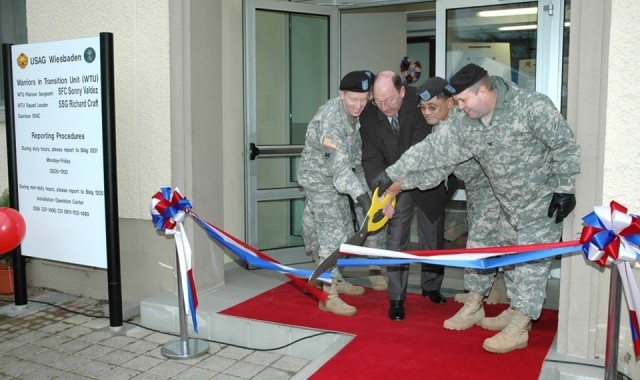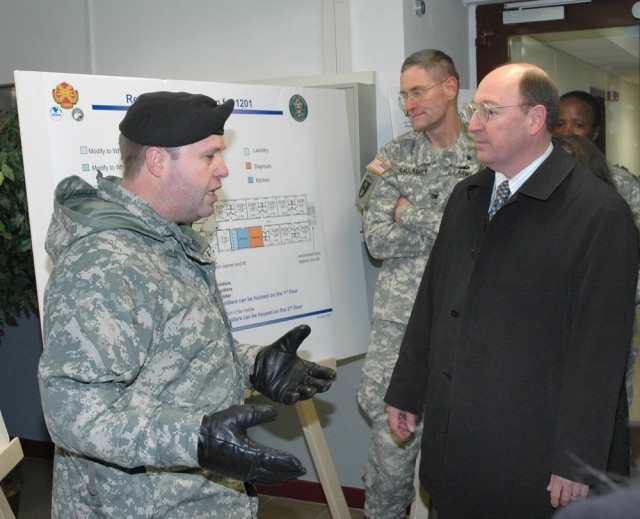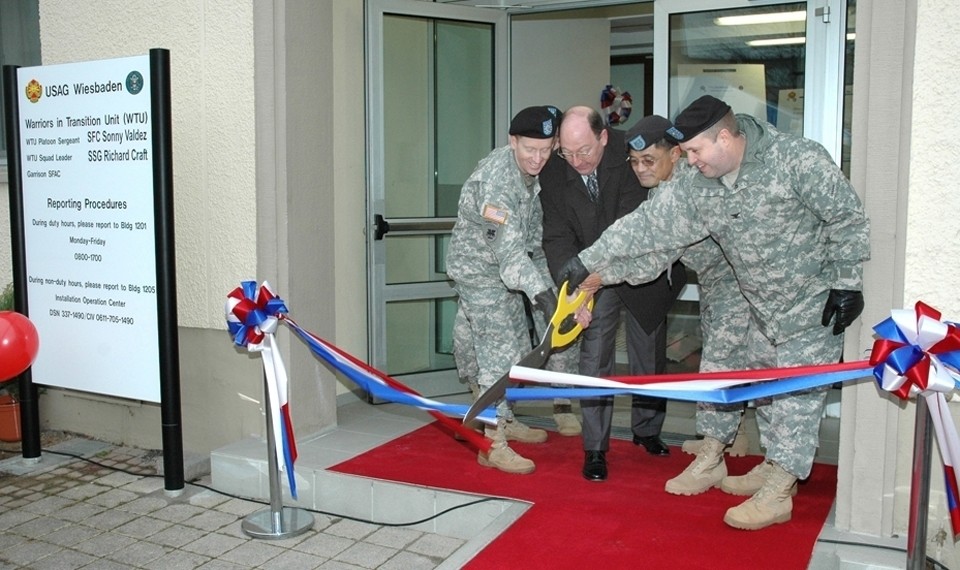WIESBADEN, Germany - Capt. Madalyn Melin was frustrated. Attempting to make yet another medical appointment, she was at the point of giving up.
Then the phone rang. As she picked up, a voice on the other end said, "Hello, I'm Sgt. 1st Class Sonny Valdez, and I want to help you heal."
That attitude went a long way toward helping Melin recover during her stay at the U.S. Army Garrison Wiesbaden Warrior Transition Unit.
"Living the Warrior Ethos, our Soldiers consistently put the mission first, sometimes placing themselves in harm's way or experience the cumulative rigors of a Soldier's life which often take their toll on health and wellness," said Col. Ray Graham, U.S. Army Garrison Hessen/Wiesbaden commander, during an official opening ceremony of Wiesbaden's WTU Feb. 5.
When a Soldier arrives at the WTU, the mission becomes one of healing. To ensure this, the physician, nurse and case manager focus on treatment while the platoon cadre focuses on leadership, accountability and life support.
"In many ways we are their parents, their mentor, adviser, leader and protector while they are going through to the next chapter," said Valdez, USAG Wiesbaden WTU Cadre platoon sergeant.
The garrison's Soldier and Family Assistance Center coordinator focuses on a myriad of available services and support programs to help the Soldier and Family.
"It's not a 'one-size-fits-all' approach. Each Soldier has a different need, and we the SFAC are the conduit for linking the Soldier to the services they need in the community," said Sharon Fields, interim SFAC. "My focus is personalizing the resources and services for each Soldier to ensure they get the proper assistance to meet their specific need."
For many Soldiers, not accustomed to such personalized care in the military, treatment at Wiesbaden's WTU is an eye-opener.
"This is crazy, I have never seen anything like this," said Spc. Winnie Armour, a recovering Soldier with USAG Wiesbaden WTU. "The treatment is superb. This is a different breed of Soldiers. When I needed something they were quick to get me what I needed."
That was also the impression of Spc. Joseph Gooch and his wife, Stefanie - the first family to pass through the Wiesbaden facility. "Everything has been spectacular. ... I'm confident that everything that they've given me here is more than enough to prepare me for what's ahead."
For Pfc. Richard Bodenschatz, an injured military policeman, getting specialized treatment while healing has been difficult on a personal level. "I would rather be with my unit in the barracks," he said, explaining that while he realizes the WTU has significantly helped in his recovery, he feels removed from his fellow MPs.
"It doesn't bother me what the other Soldiers may think now, I know what I have to do to heal," said Spc. Ramell Blacknall. "This is my body, and in 40 years I will have to deal with the issues of this body."
"WTU is a long time coming," said Sgt. 1st Class Nick Grandison, a former first sergeant and platoon leader who often had to work through processing Soldiers in and out of units - and ultimately the Army - because programs such as the WTU did not exist to better identify and address suffering troops in need of time and a proper place to heal.
"I wish we would have had them before," Grandison said. "Units can now be at full speed when they go downrange, because the injured Soldier is identified early, and their healing can start sooner."
Whether a Soldier returns to regular duty or transitions to another phase in life - having a place and time to heal properly is going a long way toward improving overall wellness in the military.
"I'm honored to see the reality of the Army putting forth the efforts and resources to make sure of Soldiers' healing," said Melin, who received the meritorious service medal while at the Wiesbaden WTU. "I remember my time as a West Point cadet and how I wanted to do much more. Since (my military career) has to end now, I'm happy that it ends here."
Related Links:
See related article: Army Helping Soldiers Heal at Wiesbaden WTU




Social Sharing